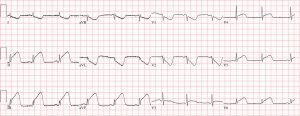Farheen wani
Anxiety is a complicated psychological phenomenon that impacts millions of individuals worldwide. One of the familiar physical symptoms associated with anxiety is chest pain. In this retort, we will delve into the intricate connection between anxiety and chest pain, analyzing the various aspects that contribute to this incident.
Chest pain is characterized by discomfort or a feeling of pressure in the chest region. It can vary from mild to painful and is often alarming for individuals who undergo it. Anxiety-induced chest pain can manifest in different ways, such as a dull ache, sharp pain, or a sense of tightness in the chest area.
Understanding the physiological facets of anxiety can shed light on why it causes chest pain. Anxiety triggers the dismissal of stress hormones, such as adrenaline and cortisol, into the bloodstream. These hormones prepare the body for the “fight-or-flight” response, increasing heart rate, constricting blood vessels, and normally heightening vigilance.
The drastic surge of adrenaline can lead to several physical changes, including increased muscle tension. Muscles in the chest area may tighten as a defensive mechanism, as the body perceives a potential threat. This tension can contribute to the experience of chest pain among individuals with anxiety. Additionally, the heightened heart rate and blood flow can make sensations in the chest area more noticeable, further enriching the perception of pain.
Another factor that plays a role in anxiety-related chest pain is hyperventilation. During periods of anxiety, individuals tend to inhale and exhale rapidly and shallowly, often without even realizing it. This type of breathing, known as hyperventilation, can lead to an imbalance in carbon dioxide and oxygen levels in the body. This imbalance impacts the functioning of the heart and blood vessels, potentially resulting in chest discomfort.
Moreover, anxiety can cause exaggerated awareness of bodily sensations. Individuals with anxiety tend to be hyper-vigilant to physical cues, constantly scanning their bodies for any cues of danger. This heightened bodily awareness can intensify normal sensations, leading to an overinterpretation of normal bodily functions as chest pain.
It is also important to recognize the role of psychological factors in anxiety-related chest pain. Anxiety can be accompanied by catastrophic thinking, wherein individuals catastrophize and interpret physical sensations as signs of a life-threatening condition, such as a heart attack. This cognitive aspect can exacerbate the physical symptoms, making the chest pain feel more intense and terrifying.
Furthermore, the interplay between anxiety and existing medical conditions should be taken into account. Individuals with pre-existing heart conditions, such as coronary artery disease or mitral valve prolapse, may experience chest pain that is both a result of anxiety and their underlying condition. In such cases, it is crucial to rule out any serious cardiac issues through medical evaluation.
To manage anxiety-induced chest pain, various strategies can be employed. First, addressing the underlying anxiety itself is crucial. This can be achieved through therapy, such as cognitive-behavioral therapy (CBT), which helps individuals identify and reframe anxiety-provoking thoughts and behaviors. Additionally, relaxation techniques like deep breathing exercises, meditation, and progressive muscle relaxation can help reduce muscle tension and promote overall calmness.
Engaging in regular physical exercise can also be beneficial in managing anxiety and alleviating chest pain. Exercise not only helps release endorphins, which enhance mood, but also aids in maintaining cardiovascular health. Furthermore, ensuring a balanced lifestyle with healthy eating habits, adequate sleep, and stress management techniques can have a significant impact on anxiety levels and subsequently reduce chest pain.
Anxiety-induced chest pain can be a distressing symptom experienced by many individuals. Understanding the physiological, psychological, and cognitive aspects of anxiety is key in comprehending why anxiety causes chest pain. By addressing anxiety through therapy, relaxation techniques, regular exercise, and a holistic approach to self-care, it is possible to manage anxiety-related chest pain effectively and enhance overall well-being.



